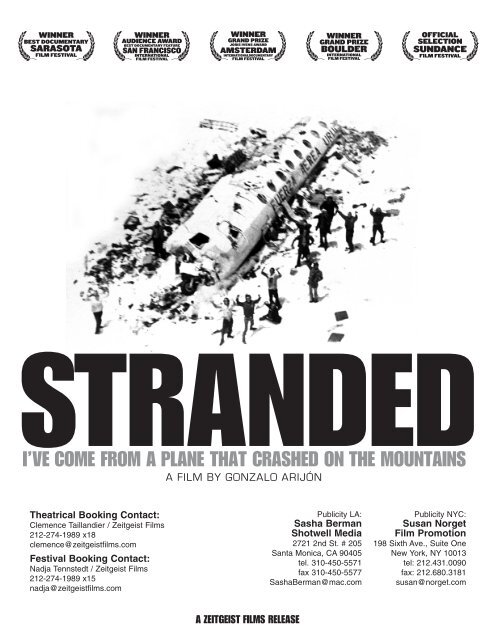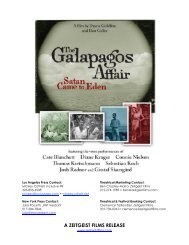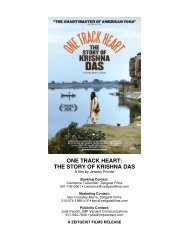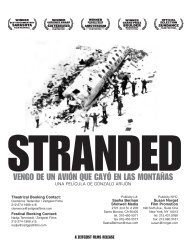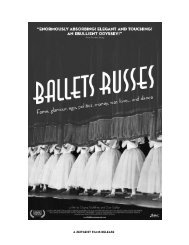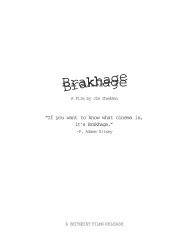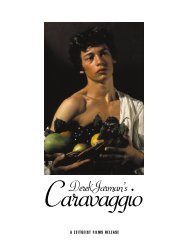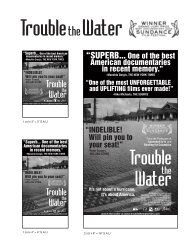i've come from a plane that crashed on the mountains - Zeitgeist Films.
i've come from a plane that crashed on the mountains - Zeitgeist Films.
i've come from a plane that crashed on the mountains - Zeitgeist Films.
Create successful ePaper yourself
Turn your PDF publications into a flip-book with our unique Google optimized e-Paper software.
WINNER<br />
BEST DOCUMENTARY<br />
SARASOTA<br />
FILM FESTIVAL<br />
WINNER<br />
AUDIENCE AWARD<br />
BEST DOCUMENTARY FEATURE<br />
SAN FRANCISCO<br />
INTERNATIONAL<br />
FILM FESTIVAL<br />
STRANDED<br />
I’VE COME FROM A PLANE THAT CRASHED ON THE MOUNTAINS<br />
A FILM BY GONZALO ARIJÓN<br />
Theatrical Booking C<strong>on</strong>tact:<br />
Clemence Taillandier / <strong>Zeitgeist</strong> <strong>Films</strong><br />
212-274-1989 x18<br />
clemence@zeitgeistfilms.com<br />
Festival Booking C<strong>on</strong>tact:<br />
Nadja Tennstedt / <strong>Zeitgeist</strong> <strong>Films</strong><br />
212-274-1989 x15<br />
nadja@zeitgeistfilms.com<br />
WINNER<br />
GRAND PRIZE<br />
JORIS IVENS AWARD<br />
AMSTERDAM<br />
INTERNATIONALDOCUMENTARY<br />
FILM FESTIVAL<br />
A ZEITGEIST FILMS RELEASE<br />
WINNER<br />
GRAND PRIZE<br />
BOULDER<br />
INTERNATIONAL<br />
FILM FESTIVAL<br />
Publicity LA:<br />
Sasha Berman<br />
Shotwell Media<br />
2721 2nd St. # 205<br />
Santa M<strong>on</strong>ica, CA 90405<br />
tel. 310-450-5571<br />
fax 310-450-5577<br />
SashaBerman@mac.com<br />
OFFICIAL<br />
SELECTION<br />
SUNDANCE<br />
FILM FESTIVAL<br />
Publicity NYC:<br />
Susan Norget<br />
Film Promoti<strong>on</strong><br />
198 Sixth Ave., Suite One<br />
New York, NY 10013<br />
tel: 212.431.0090<br />
fax: 212.680.3181<br />
susan@norget.com
STRANDED<br />
I’VE COME FROM A PLANE THAT CRASHED ON THE MOUNTAINS<br />
It is <strong>on</strong>e of <strong>the</strong> most ast<strong>on</strong>ishing and inspiring survival tales of all time.<br />
On October 13, 1972, a young rugby team <str<strong>on</strong>g>from</str<strong>on</strong>g> M<strong>on</strong>tevideo, Uruguay,<br />
boarded a <str<strong>on</strong>g>plane</str<strong>on</strong>g> for a match in Chile—and <strong>the</strong>n vanished into thin air.<br />
Two days before Christmas, 16 of <strong>the</strong> 45 passengers miraculously<br />
resurfaced. They had managed to survive for 72 days after <strong>the</strong>ir <str<strong>on</strong>g>plane</str<strong>on</strong>g><br />
<str<strong>on</strong>g>crashed</str<strong>on</strong>g> <strong>on</strong> a remote Andean glacier. Thirty-five years later, <strong>the</strong> survivors<br />
returned to <strong>the</strong> crash site—known as <strong>the</strong> Valley of Tears—to recount <strong>the</strong>ir<br />
harrowing story of defiant endurance and indestructible friendship.<br />
Previously documented in <strong>the</strong> 1973 worldwide bestseller Alive (and <strong>the</strong><br />
1993 Ethan Hawke movie of <strong>the</strong> same name), this shocking true story<br />
finally gets <strong>the</strong> cinematic treatment it deserves. Visually breathtaking and<br />
crafted with riveting detail by documentary filmmaker (and childhood<br />
friend of <strong>the</strong> survivors) G<strong>on</strong>zalo Arij<strong>on</strong> with a masterful combinati<strong>on</strong> of<br />
<strong>on</strong>-locati<strong>on</strong> interviews, archival footage and reenactments, Stranded is by<br />
turns hauntingly powerful and spiritually moving.
THE STORY<br />
On October 12, 1972, a Uruguayan army <str<strong>on</strong>g>plane</str<strong>on</strong>g> left M<strong>on</strong>tevideo for Santiago in Chile. The <str<strong>on</strong>g>plane</str<strong>on</strong>g> was<br />
chartered by <strong>the</strong> “Christian Bro<strong>the</strong>rs”, a rugby team <str<strong>on</strong>g>from</str<strong>on</strong>g> Carrasco, an upmarket suburb of M<strong>on</strong>tevideo,<br />
who were planning to play a friendly match in Chile and—accompanied by a few parents and friends—<br />
spend a pleasant weekend <strong>on</strong> <strong>the</strong> shores of <strong>the</strong> Pacific.<br />
Bad wea<strong>the</strong>r forced <strong>the</strong> <str<strong>on</strong>g>plane</str<strong>on</strong>g> to land in Mendoza, a small town <strong>on</strong> <strong>the</strong> Argentinean slopes of <strong>the</strong> Andes.<br />
On October 13, <strong>the</strong> <str<strong>on</strong>g>plane</str<strong>on</strong>g> took off <strong>on</strong>ce again. At 3:30pm <strong>the</strong> pilot transmitted his positi<strong>on</strong> to <strong>the</strong> c<strong>on</strong>trol<br />
tower in Santiago. But when <strong>the</strong> tower attempted to communicate with <strong>the</strong> aircraft a minute later <strong>the</strong>re<br />
was no reply.<br />
Chile, Argentina and Uruguay joined forces to search for <strong>the</strong> <str<strong>on</strong>g>plane</str<strong>on</strong>g>, but <strong>the</strong>re had been excepti<strong>on</strong>ally<br />
heavy snowfall in <strong>the</strong> <strong>mountains</strong> and since <strong>the</strong> fuselage was white <strong>the</strong>re was little chance of finding <strong>the</strong><br />
<str<strong>on</strong>g>plane</str<strong>on</strong>g> and even less chance <str<strong>on</strong>g>that</str<strong>on</strong>g> any of <strong>the</strong> 45 passengers had survived.<br />
Then, seventy days after <strong>the</strong> crash, a Chilean shepherd, who was watching his flock in <strong>the</strong> foothills of <strong>the</strong><br />
Andes, caught sight of <strong>the</strong> outline of two men <strong>on</strong> <strong>the</strong> o<strong>the</strong>r side of a torrential river. Gesticulating frantically,<br />
<strong>the</strong>y fell to <strong>the</strong>ir knees, <strong>the</strong>ir arms wide open. The shepherd took <strong>the</strong>m for tourists and left.<br />
However, <strong>the</strong> next day he came back to <strong>the</strong> same spot and saw <str<strong>on</strong>g>that</str<strong>on</strong>g> <strong>the</strong> men were still <strong>the</strong>re. The sound<br />
of <strong>the</strong> water was so loud <strong>on</strong> <strong>the</strong> banks of <strong>the</strong> river <str<strong>on</strong>g>that</str<strong>on</strong>g> it was impossible for <strong>the</strong> three men to hear each<br />
o<strong>the</strong>r so <strong>the</strong> shepherd threw a piece of paper and a pen, wrapped in a handkerchief, over <strong>the</strong> river. The<br />
two bearded men in rags wrote something <strong>on</strong> <strong>the</strong> paper and threw it back to <strong>the</strong> shepherd: “We’re <str<strong>on</strong>g>from</str<strong>on</strong>g> a<br />
<str<strong>on</strong>g>plane</str<strong>on</strong>g> <str<strong>on</strong>g>that</str<strong>on</strong>g> <str<strong>on</strong>g>crashed</str<strong>on</strong>g> <strong>on</strong> <strong>the</strong> <strong>mountains</strong>. Fourteen of our friends are still alive up <strong>the</strong>re.”<br />
They had not <strong>on</strong>ly survived a <str<strong>on</strong>g>plane</str<strong>on</strong>g> crash and three winter m<strong>on</strong>ths in <strong>the</strong> Andes, but also an avalanche<br />
<str<strong>on</strong>g>that</str<strong>on</strong>g> killed 8 of <strong>the</strong>ir friends and trapped <strong>the</strong> rest of <strong>the</strong>m in <strong>the</strong> fuselage for three days—<strong>the</strong> fuselage <str<strong>on</strong>g>that</str<strong>on</strong>g><br />
up to this point had been <strong>the</strong>ir <strong>on</strong>ly shelter. Ten days after <strong>the</strong> crash <strong>the</strong>y learned <str<strong>on</strong>g>from</str<strong>on</strong>g> a still functi<strong>on</strong>ing<br />
radio <str<strong>on</strong>g>that</str<strong>on</strong>g> <strong>the</strong> search had been aband<strong>on</strong>ed and by this time <strong>the</strong>ir meagre food supplies had run out. They<br />
had seen <strong>the</strong>ir friends succumb <strong>on</strong>e by <strong>on</strong>e to <strong>the</strong>ir injuries, dying in <strong>the</strong>ir arms. Despite all this, <strong>the</strong>y had<br />
managed to <str<strong>on</strong>g>come</str<strong>on</strong>g> up with devices to melt <strong>the</strong> snow to water, to protect <strong>the</strong>ir eyes against snow blindness<br />
and to cross <strong>the</strong> snow without sinking in.<br />
Growing impatient with <strong>the</strong>ir fate <strong>the</strong>y started expediti<strong>on</strong>s, each time daring to go a bit fur<strong>the</strong>r away <str<strong>on</strong>g>from</str<strong>on</strong>g><br />
<strong>the</strong> safety of <strong>the</strong> camp than before, to find out what was behind <strong>the</strong> mountain range, <strong>on</strong>ly to find more<br />
dead bodies—and eventually <strong>the</strong> tail of <strong>the</strong> <str<strong>on</strong>g>plane</str<strong>on</strong>g>, in which <strong>the</strong>y found batteries, some food and most<br />
importantly <strong>the</strong> material to tailor a sleeping bag. It was this sleeping bag <str<strong>on</strong>g>that</str<strong>on</strong>g> finally enabled <strong>the</strong>m to veer<br />
far<strong>the</strong>r away <str<strong>on</strong>g>from</str<strong>on</strong>g> <strong>the</strong> <str<strong>on</strong>g>plane</str<strong>on</strong>g>, as <strong>the</strong>y could now also survive <strong>the</strong> freezing cold of <strong>the</strong> nights in <strong>the</strong> Andes.<br />
Picking <strong>the</strong> str<strong>on</strong>gest am<strong>on</strong>g <strong>the</strong>m, feeding <strong>the</strong>m bigger rati<strong>on</strong>s and sparing <strong>the</strong>m <str<strong>on</strong>g>from</str<strong>on</strong>g> <strong>the</strong> daily duties,<br />
<strong>the</strong>y prepared for <strong>the</strong>ir last hope of rescue—sending two of <strong>the</strong>ir party into <strong>the</strong> unknown mountain<br />
ranges.<br />
20-year-old Fernando “Nando” Parrado and 19-year-old Roberto Canessa walked 44 miles over <strong>the</strong><br />
<strong>mountains</strong>, crossing summits more than 13,000 feet high, with no equipment o<strong>the</strong>r than rugby boots.<br />
Reports worldwide spoke of <strong>the</strong> “survivors of <strong>the</strong> century” and—maybe because <strong>the</strong>y were rescued two<br />
days before Christmas—<strong>the</strong> “Miracle of <strong>the</strong> Andes”.<br />
Shortly after <strong>the</strong>ir rescue, in a heated press c<strong>on</strong>ference, <strong>the</strong> survivors made a startling admissi<strong>on</strong> “… <strong>the</strong><br />
day came when we had nothing left to eat, and we said <str<strong>on</strong>g>that</str<strong>on</strong>g> Christ, by offering his flesh and blood during<br />
<strong>the</strong> Last Supper, had shown us <strong>the</strong> way by indicating <str<strong>on</strong>g>that</str<strong>on</strong>g> we had to do likewise: take his flesh and<br />
blood, incarnated in our friends who had died in <strong>the</strong> crash... It was a pers<strong>on</strong>al communi<strong>on</strong> for each <strong>on</strong>e<br />
of us… It’s what helped us to survive…” One of our greatest taboos had been defied. And made public.<br />
The whole world was in shock.
THE SURVIVORS<br />
IN THEIR OWN WORDS<br />
For <strong>the</strong> first time, <strong>the</strong> survivors of <strong>the</strong> Uruguayan <str<strong>on</strong>g>plane</str<strong>on</strong>g> crash have agreed to tell us everything—<str<strong>on</strong>g>from</str<strong>on</strong>g><br />
“beginning to end”—to relive <strong>the</strong> raw, intact memory of those 72 days in <strong>the</strong> <strong>mountains</strong>.<br />
The joy of <strong>the</strong> departure. The crash, <strong>the</strong> deaths, <strong>the</strong> wounded. The wait. The rescue services not turning<br />
up. The discouragement. Hunger setting in. The terrible decisi<strong>on</strong> to eat <strong>the</strong> bodies of <strong>the</strong>ir dead friends.<br />
The avalanche in <strong>the</strong> middle of <strong>the</strong> night which killed ano<strong>the</strong>r eight people. Fighting to stay alive, while<br />
<strong>the</strong> world c<strong>on</strong>tinued without <strong>the</strong>m. The beginnings of a “new society”…<br />
“As time goes <strong>on</strong>, I increasingly have <strong>the</strong> feeling <str<strong>on</strong>g>that</str<strong>on</strong>g> we experienced a sort of “laboratory experiment”:<br />
you throw 30 or so young Western city-dwellers into <strong>the</strong> snow. You deprive <strong>the</strong>m of aid and supplies. But<br />
<str<strong>on</strong>g>that</str<strong>on</strong>g>’s not all: you provoke an avalanche <str<strong>on</strong>g>that</str<strong>on</strong>g> wipes out a dozen of <strong>the</strong>m but which, paradoxically, offers<br />
<strong>the</strong> o<strong>the</strong>rs <strong>the</strong> protein necessary for <strong>the</strong>ir survival… And you wait….” —Roberto Canessa<br />
“At <strong>the</strong> time when <strong>the</strong> group was having trouble making <strong>the</strong> decisi<strong>on</strong>, I remember saying: ‘If I were dead,<br />
<strong>the</strong>re, in <strong>the</strong> snow, and you were debating whe<strong>the</strong>r or not to use my body in an attempt to survive… If—<br />
while being dead—I had <strong>the</strong> possibility of getting up, I would kick your asses, you bunch of idiots!’ They<br />
all listened to me in silence, and I think <str<strong>on</strong>g>that</str<strong>on</strong>g> <strong>the</strong>se words helped <strong>the</strong> group to take <strong>the</strong> step.” —Gustavo<br />
Zerbino<br />
“When Roberto cut <strong>the</strong> first thin strips of meat, he placed <strong>the</strong>m <strong>on</strong> <strong>the</strong> cabin. I went to eat hastily, in<br />
secret… I felt ashamed <strong>the</strong> whole time I was up <strong>the</strong>re. I wanted to hide <str<strong>on</strong>g>that</str<strong>on</strong>g>. For a l<strong>on</strong>g time, I was<br />
obsessed by this story of human meat… But I couldn’t admit it…” —Adolfo “Fito” Strauch<br />
“What we did was <strong>the</strong> result of thinking things through <str<strong>on</strong>g>from</str<strong>on</strong>g> a pragmatic and material point of view.<br />
Something like filling <strong>the</strong> tanks with petrol. The <strong>on</strong>ly way to buy time, to delay fatal issues, while waiting<br />
to see what we could do to get out of our situati<strong>on</strong>. And our strategy succeeded.” —Roberto Canessa<br />
“When Roberto and Nando finally left <strong>the</strong> burnt-out <str<strong>on</strong>g>plane</str<strong>on</strong>g>—to attempt to cross <strong>the</strong> Andes <strong>on</strong> foot towards<br />
<strong>the</strong> west—Nando, who had lost his mo<strong>the</strong>r and sister in <strong>the</strong> crash, turned around to me to say: ‘Carlitos,<br />
if it takes l<strong>on</strong>ger than expected for us to return, I authorize you to do as you see fit with <strong>the</strong> bodies of my<br />
mo<strong>the</strong>r and sister.’ He didn’t have to say such a thing to us, but he wanted to do it. For me, it was <strong>the</strong><br />
bravest act possible.” —Carlos Páez<br />
“When <strong>the</strong> first rescuers came down <str<strong>on</strong>g>from</str<strong>on</strong>g> <strong>the</strong> helicopters, <strong>the</strong>y must have had an incredible shock when<br />
<strong>the</strong>y saw all <strong>the</strong>se human remains around <strong>the</strong> cabin. They had to spend <strong>the</strong> night with us in <strong>the</strong> fuselage,<br />
to wait for a storm to blow over. Their presence filled us with joy, because we were saved, and it made<br />
us feel incredibly hungry. Their powdered soup wasn’t enough, and we ate human flesh in fr<strong>on</strong>t of <strong>the</strong>m,<br />
because we had nothing to hide. In <strong>the</strong> end, <strong>the</strong>y decided to sleep in a tent, about 200 feet <str<strong>on</strong>g>from</str<strong>on</strong>g> <strong>the</strong><br />
<str<strong>on</strong>g>plane</str<strong>on</strong>g>, holding a revolver…. Poor guys!” —Gustavo Zerbino<br />
“When we were coming down <strong>the</strong> mountain, thin and starving, I saw a priest, and without thinking, I told<br />
him everything. Absolutely everything. It was like a purge, something I had kept inside me and <str<strong>on</strong>g>that</str<strong>on</strong>g> “had<br />
to <str<strong>on</strong>g>come</str<strong>on</strong>g> out,” <strong>on</strong>e way or ano<strong>the</strong>r. Immediately afterwards, I asked him to hear my c<strong>on</strong>fessi<strong>on</strong>. And he<br />
replied: “My s<strong>on</strong>, you’ve already c<strong>on</strong>fessed. May God be with you”. This helped me so much to accept<br />
what I’d d<strong>on</strong>e…” —José-Luis Inciarte<br />
“If I had my time over again, I wouldn’t wait so l<strong>on</strong>g—ten days—before deciding to eat human flesh.<br />
What we did, o<strong>the</strong>rs did before us—during wars for instance—<strong>on</strong>ly we gave ‘surnames and first names’<br />
to this act.” —Carlos Páez
“We experience cannibalism <strong>on</strong> Earth every day, where <strong>the</strong> weak are crushed, where <strong>the</strong> race for pers<strong>on</strong>al<br />
interests crushes all those who happen to be in <strong>the</strong> way… The complete opposite of what we<br />
experienced up <strong>the</strong>re, where we all endeavored to do our utmost, for ourselves and o<strong>the</strong>rs, even <strong>the</strong><br />
weakest…” —Carlos Paez<br />
“The Vatican approved what we had d<strong>on</strong>e. However, if it had c<strong>on</strong>demned us, it would have had <strong>the</strong> same<br />
effect <strong>on</strong> me. I have no scruples and d<strong>on</strong>’t feel guilty about what I did. I accept it. Life—i.e. poetry, inventi<strong>on</strong>,<br />
intelligence—is more important than death. That’s my <strong>on</strong>e and <strong>on</strong>ly rule.” —Eduardo Strauch<br />
“The spirit of my dead friends isn’t inside me, no. On <strong>the</strong> o<strong>the</strong>r hand, I can feel <strong>the</strong>m floating around me.<br />
In <strong>the</strong> beginning, not l<strong>on</strong>g after it happened, those who were no l<strong>on</strong>ger <strong>the</strong>re were still omnipresent. It<br />
was as though <strong>the</strong>y were shouting at us, which prevented us <str<strong>on</strong>g>from</str<strong>on</strong>g> visiting <strong>the</strong>ir parents and families,<br />
despite <strong>the</strong> fact <str<strong>on</strong>g>that</str<strong>on</strong>g> we had known each o<strong>the</strong>r for a l<strong>on</strong>g time, because we all went to <strong>the</strong> same school<br />
and lived in <strong>the</strong> same area.<br />
“Maybe in <strong>the</strong> beginning, owing to <strong>the</strong> fact <str<strong>on</strong>g>that</str<strong>on</strong>g> <strong>the</strong>y were too young to die, <strong>the</strong>y didn’t know what to do to<br />
be <strong>on</strong>ly pure spirits. They still wanted to be part of <strong>the</strong> land of <strong>the</strong> living. That created a c<strong>on</strong>flict between<br />
<strong>the</strong>m and us. Little by little, <strong>the</strong>y seemed to find <strong>the</strong>ir place. Or perhaps it was us <str<strong>on</strong>g>that</str<strong>on</strong>g> learnt to simply<br />
make <strong>the</strong>m invisible. Even though I feel more like <strong>the</strong>ir fa<strong>the</strong>r every day, <strong>the</strong> fa<strong>the</strong>r of all those <str<strong>on</strong>g>that</str<strong>on</strong>g> aren’t<br />
here…<br />
“I must admit <str<strong>on</strong>g>that</str<strong>on</strong>g> as <strong>the</strong> years go by, I can hear <strong>the</strong>m increasingly. They’re <strong>the</strong>re all <strong>the</strong> same, and<br />
<strong>the</strong>y’re whispering to us…” —Roberto Canessa
GONZALO ARIJON<br />
Director<br />
G<strong>on</strong>zalo Arijón was born in M<strong>on</strong>tevideo, Uruguay in 1956 but has lived in France since<br />
1979. Over <strong>the</strong> past 15 years, he has directed numerous documentaries, including Lula’s<br />
Brazil: Managing a Dream; Far Very Far <str<strong>on</strong>g>from</str<strong>on</strong>g> Rome; The Dark Side of Milosevic; Rio de<br />
Janeiro–A Vertical War; and For These Eyes, which w<strong>on</strong> numerous awards at internati<strong>on</strong>al<br />
film festivals. Arijón is a childhood friend of many of <strong>the</strong> young men featured in<br />
Stranded.<br />
“Several of <strong>the</strong>se survivors are friends of mine. We shared <strong>the</strong> same carefree teenage<br />
years. I was shocked by <strong>the</strong>ir disappearance and dumbfounded when <strong>the</strong>y came back to<br />
life. I shared whole nights with <strong>the</strong>m, listening to <strong>the</strong>ir stories which c<strong>on</strong>stantly revolved<br />
around <strong>the</strong>ir survival up <strong>the</strong>re. Their tragic—but also amazing!—epic c<strong>on</strong>tinued to haunt<br />
<strong>the</strong>m, day after day, year after year. And it’s still <strong>the</strong> case today. Despite a best-seller<br />
[Alive! The Story of <strong>the</strong> Andes Survivors by Piers Paul Read, five milli<strong>on</strong> copies sold in<br />
English al<strong>on</strong>e], and despite a Hollywood movie [Alive by Frank Marshall, a 1993 Disney-<br />
Paramount co-producti<strong>on</strong>], we still have <strong>the</strong> feeling <str<strong>on</strong>g>that</str<strong>on</strong>g> this story has never been told<br />
<str<strong>on</strong>g>from</str<strong>on</strong>g> <strong>the</strong> inside, <str<strong>on</strong>g>that</str<strong>on</strong>g> what <strong>the</strong>y have to say has never really been heard. And <strong>the</strong>re is<br />
always this growing feeling am<strong>on</strong>g <strong>the</strong>m <str<strong>on</strong>g>that</str<strong>on</strong>g> <strong>the</strong>y have something to tell us, to transmit<br />
to us, <str<strong>on</strong>g>that</str<strong>on</strong>g> is way bey<strong>on</strong>d an “enormous anecdote”... Thirty years after <strong>the</strong> event, I<br />
suggested making a film about it. A film <str<strong>on</strong>g>that</str<strong>on</strong>g> tells of <strong>the</strong> creati<strong>on</strong> of a new society, cut off<br />
<str<strong>on</strong>g>from</str<strong>on</strong>g> <strong>the</strong> rest of <strong>the</strong> world, requiring <strong>the</strong> reinventi<strong>on</strong> of codes and rules. No leaders—in<br />
<strong>the</strong> traditi<strong>on</strong>al sense of <strong>the</strong> term—but ra<strong>the</strong>r a collecti<strong>on</strong> of pers<strong>on</strong>alities <str<strong>on</strong>g>that</str<strong>on</strong>g> are<br />
gradually revealed, which harm<strong>on</strong>iously head towards a comm<strong>on</strong> objective: to get out of<br />
this hell toge<strong>the</strong>r, and return to <strong>the</strong> land of <strong>the</strong> living toge<strong>the</strong>r. An exemplary story about<br />
exceeding <strong>on</strong>eself, getting to know <strong>on</strong>e ano<strong>the</strong>r, <str<strong>on</strong>g>that</str<strong>on</strong>g> deals with <strong>the</strong> importance of<br />
friendship and solidarity in extreme situati<strong>on</strong>s.”<br />
CESAR CHARLONE<br />
Cinematographer<br />
–G<strong>on</strong>zalo Arijón<br />
The reenacted scenes of <strong>the</strong> <str<strong>on</strong>g>plane</str<strong>on</strong>g>’s cabin after <strong>the</strong> crash were filmed in super 16mm by<br />
César Charl<strong>on</strong>e, cinematographer of City of God, for which he was nominated for an<br />
Oscar for Best Cinematography, as well as The C<strong>on</strong>stant Gardener and Blindness (all<br />
directed by Fernando Meirelles). Charl<strong>on</strong>e was almost <strong>on</strong> Flight 571 himself. He went to<br />
<strong>the</strong> same college as <strong>the</strong> survivors (his fa<strong>the</strong>r was <strong>the</strong> Uruguayan ambassador to Chile)<br />
and Nando was his best friend. He was <strong>on</strong> <strong>the</strong> passenger list for <strong>the</strong> flight but he was<br />
traveling <str<strong>on</strong>g>from</str<strong>on</strong>g> Brazil and, as luck would have it, didn’t get to M<strong>on</strong>tevideo in time to catch<br />
<strong>the</strong> doomed <str<strong>on</strong>g>plane</str<strong>on</strong>g>.
STRANDED<br />
I’VE COME FROM A PLANE THAT CRASHED ON THE MOUNTAINS<br />
A film by G<strong>on</strong>zalo Arijón<br />
Directors of Photography César Charl<strong>on</strong>e & Pablo Hernán Zubizarreta<br />
Color Correcti<strong>on</strong> Guillermo Fernandez<br />
Film Editors Claudio Hughes, Samuel Lajus & Alice Larry<br />
Sound Designer Fabian Oliver<br />
Original Music Florencia Di C<strong>on</strong>cilio-Perrin<br />
Sound Mixer Georges Lafitte<br />
Produced by Marc Silvera<br />
with<br />
The 16 Survivors<br />
Jose Pedro Algorta • Roberto Canessa • Alfredo Delgado • Daniel Fernández<br />
Roberto François • Roy Harley • José-Luis Inciarte • Alvaro Mangino • Javier Methol<br />
Carlos Páez • Fernando Parrado • Ramón Sabella • Adolfo Strauch<br />
Eduardo Strauch • Ant<strong>on</strong>io Vinzintín • Gustavo Zerbino<br />
and<br />
José Gilberto Bravo Castro • Laura Inés Canessa • Ant<strong>on</strong>io Caruso<br />
Juan Catalán • Sergio Catalán • Jorge Massa • Juan Pedro Nicola<br />
Mateo Nicola • Carlos Páez-Vilaró • Madelón Rodríguez • Alejandra Strauch<br />
Gustavo Zerbino Payssé • Lucas Zerbino Payssé • Martin Zerbino Payssé<br />
Sebastian Zerbino Payssé<br />
A coproducti<strong>on</strong><br />
ARTE France - Ethan Producti<strong>on</strong>s - La Realidad<br />
The ITVS - Internati<strong>on</strong>al Media Development Fund (IMDF)<br />
in associati<strong>on</strong> with<br />
Alea Doc & <strong>Films</strong> (Barcel<strong>on</strong>a)<br />
Morocha <strong>Films</strong> (Buenos Aires)<br />
Sylic<strong>on</strong>e (Paris)<br />
France • 2008 • 126 mins • Color and B&W • In Spanish with English subtitles<br />
Press materials are available at www.zeitgeistfilms.com/stranded<br />
A ZEITGEIST FILMS RELEASE<br />
247 CENTRE ST • 2ND FL • NEW YORK • NY 10013<br />
www.zeitgeistfilms.com • mail@zeitgeistfilms.com<br />
(212) 274-1989 • FAX (212) 274-1644


